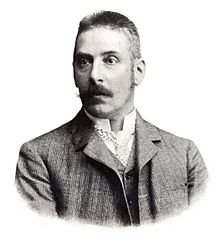István Rakovszky
| István Rakovszky de Nagyrákó et Nagyselmecz | |
|---|---|
 |
|
| Prime Minister of the Rival Government of the Kingdom of Hungary | |
|
In office 21 October – 26 October 1921 |
|
| Speaker of the National Assembly of Hungary | |
|
In office 18 February 1920 – 30 July 1921 |
|
| Succeeded by | Gaszton Gaál |
| Personal details | |
| Born |
18 June 1858 Vienna, Austrian Empire |
| Died | 12 August 1931 (aged 73) Budapest, Kingdom of Hungary |
| Nationality | Hungarian |
| Political party | Catholic People's Party, KGSZP, KNEP |
| Spouse(s) | Mária Majthényi de Kesselőkeő |
| Children | Egon Miklós Mária Zsófia |
| Profession | Politician |
István Rakovszky de Nagyrákó et Nagyselmecz (18 June 1858 – 12 August 1931) was a legitimist Hungarian politician. During the Second Royal coup d'état, Charles IV returned to Hungary to retake his throne. The attempt was unsuccessful. The king formed a rival government in Sopron and appointed Rakovszky as Prime Minister.
Born in Vienna, Rakovszky's parents were István Rakovszky (1832–1891) and Baroness Ilona Majthényi (1839–1903). He had three siblings: Béla (Adalbert), Ferenc and Marianne. István Rakovszky married to Baroness Mária Majthényi de Kesselőkeő; their children were Egon, Miklós, Mária and Zsófia.
He finished his secondary school studies in Pozsony (now: Bratislava, Slovakia). After studying law, he joined the Austro-Hungarian Army but he had to demobilize because of illness. He traveled to Venice to treatment. Returning to Liptó County, he settled down in his Estate near to Nagyselmec. He soon played a significant role in the county's oppositional movements. He had been to France many times.
At the time of the ecclesiastical political fights, he took part in the foundation of the Catholic People's Party in 1895 and served as deputy chairman of the party from 1903. He became a known politician after the Catholic Congress of 1896 where he talked about the social objectives of Christian politics as a lecturer with an unusual manner. Rakovszky belonged to the Catholic political movements' conservative-feudal wing.
He was member of the House of Representatives from 1896 to 1918 and of the Diet of Hungary from 1918 to 1926. He was one of the plenary sessions' most active representative. He represented Csorna until 1918 as politician of the Catholic People's Party. He served as parliamentarian clerk between 1896 and 1899. Rakovszky signed in the names of his party the pact between the opposition and Prime Minister Kálmán Széll on 23 February 1899. He participated in the reforming of law about the representative incompatibility.
...
Wikipedia
